Search
Did you mean: Tiglath Pileser I?
Search Results

Article
Mesopotamian Effects on Israel During the Iron Age
The Iron Age in the traditional Ancient Near Eastern chronology ranges from somewhere around 1200 BCE to 333 BCE. It begins from the era when it was first thought iron came to be used up to the ascendency of Alexander the Great as the major...

Image Gallery
A Gallery of Assyrian Warfare
The Assyrian military was the most effective – and feared – fighting force in the Near East, especially during the time of the Neo-Assyrian Empire, 912-612 BCE, when their territory expanded across Mesopotamia, the Levant, into Asia Minor...
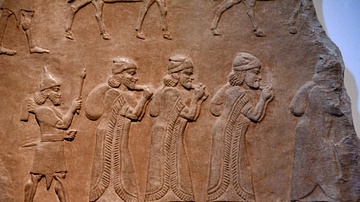
Image
Deported people from the city of Astartu
This detail depicts the deportation of the inhabitants of the city of Astartu (in modern-day Jordan Kingdom). The deported people are holding their personal belongings and are led by an Assyrian solider. The city was captured by the Assyrian...
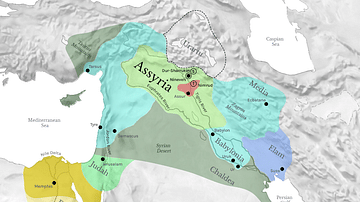
Image
Neo-Assyrian Empire c. 912-612 BCE
Map of the Neo-Assyrian Empire c. 912-612 BCE, showing expansion by Shalmeneser III (r. c. 859-824 BCE), Tiglath-Pileser III (r. c. 745-727 BCE), Sargon II (r. c. 722-705 BCE), Sennacherib (r. c. 705-681 BCE), and Ashurbanipal (r. c. 688-627...

Image
Phoenician Bronze Bowl from Nimrud
Over 150 bronze bowls were found in a palace at the city of Nimrud. These bowls were made in Phoenicia (modern-day Lebanese and Syrian coasts), and were brought to Nimrud as tribute or booty by one of the kings who campaigned in the west...
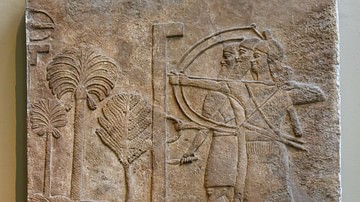
Image
Babylonia under Assyrian Siege
Assyrian relief, from the Central Palace at Nimrud (ancient Kalhu), Mesopotamia, Iraq, from the reign of Tiglath-Pileser III, c. 728 BCE. Date palms indicate that the city, most of which were on an adjacent slab, was probably Babylonia...

Image
Assyrian Battle Scene
Assyrian relief, from the Central Palace at Nimrud (ancient Kalhu), Mesopotamia, modern-day Iraq; reused later in the South-West Palace, from the reign of Tiglath-Pileser III, c. 728 BCE. An enemy horseman is ridden down by a pair of a armored...

Image
Assyrian Deportation of People
Assyrian relief, from the Central Palace at Nimrud (ancient Kalhu), Mesopotamia, Iraq. This is one of a series of panels that showed Tiglath-Pileser III's military campaigns in modern-day southern Iraq. On the left is a captured town, with...
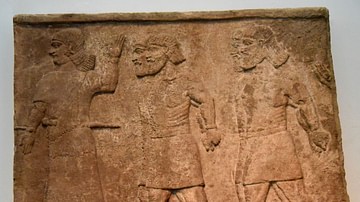
Image
Review of Arab Prisoners, Assyrian Relief
Assyrian relief, from the Central Palace at Nimrud (ancient Kalhu), Mesopotamia, Iraq, Neo-Assyrian Empire, c. 728 BCE. This is part of a series of reliefs showing Arab prisoners brought before the Assyrian King Tiglath-Pileser III (r. 744-727...
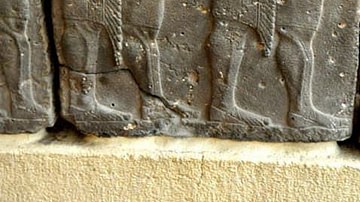
Image
Assyrian Warriors Relief
Basalt reliefs depicting Assyrian warriors of different ranks in procession with a royal chariot led by the commander-in-chief of the Assyrian army. The reliefs were acquired and gathered during the years 1848, 1946, 1948, 1982, and 1995...